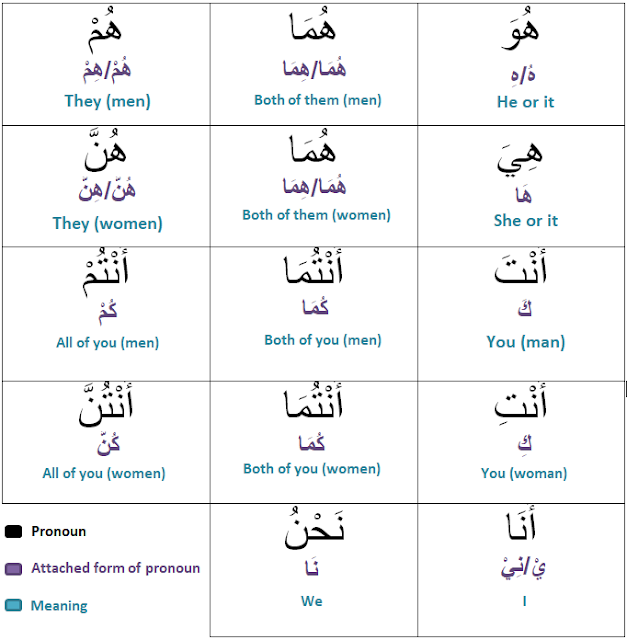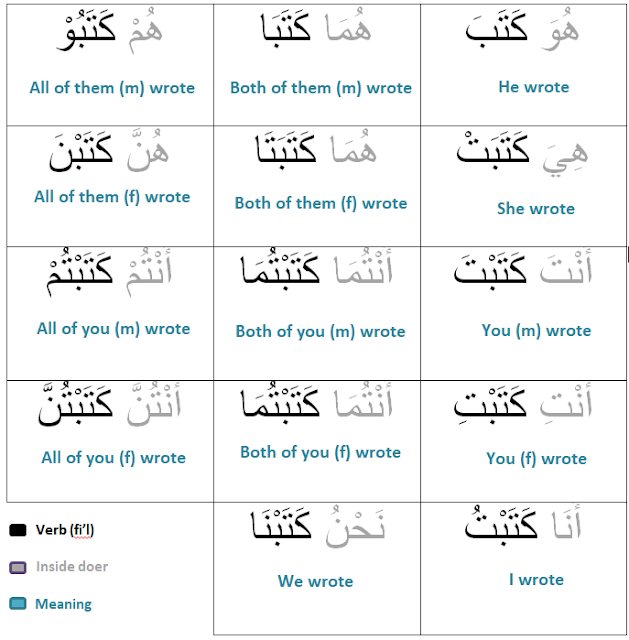Arabic past tense: practice 1
Past tense
practice 1:
There are
few things to note when memorizing these charts. Firstly, be sure to memorize
the chart with the pronouns. When you repeatedly read the chart, read it like ‘huwa
kathaba’, ‘humaa kathabaa’, ‘hum kathaboo’ and so on. Read it out loud though
it may seem weird. Because that way you will remember better In Sha Allah. Read
it repeatedly by looking at the chart at least 5 times. Then try to read it
without looking. If you can get a helper, do some practice on your own and ask
your helper to say the pronoun so that you can say the verb. For example if
your helper says huwa, you can say kathaba, and next when your helper says ‘humaa’
you can say kathabaa and so on. Do this thrice and then try to read the whole
chart independently on your own.
In this
chart specifically, you can notice that in all the verbs, the ending sounds are
changing. The sounds of the first two letters always remain the same. Also you
can notice that all the verbs of ‘you’ pronouns have the ending sounds of their
pronouns. Like anTHA kathabTHA, anTHUMA kathabTHUMA and so on. This way it’s
easy for you to remember those verbs In Sha Allah.
When you are
done memorizing this chart, try to recite the charts for the words given below.
Just try to recite at first. If you can recite the chart smoothly for all the
words, then think of the meanings of the verbs In Sha Allah.
ضَرَبَ (he hit)
خَرَجَ (he left)
بَشَّرَ (he congratulated)
أَخْبَرَ (he informed)
حَسِبَ (he assumed)
**********************************************************
ފިޢްލް މާޟީގެ ފަރިތަކުރުން 1:
މި ތާވަލުތައް ހިތުދަސްކުރާއިރު ފާހަގަކުރަންވީ ނުކުތާތައް
އެބަހުއްޓެވެ. އެންމެ ފުރަތަމަ ކަމަކަށް މި ތާވަލު ދަސްކުރުން އެންމެ ރަނގަޅީ
ޟަމީރުތަކާއެކީގައެވެ. ތަކުރާރުކޮށް ތާވަލު ކިޔާއިރު ހުވަ ކަތަބަ، ހުމާ ކަތަބާ،
ހުމް ކަތަބޫ މިފަދަ ގޮތަކަށް ކިޔާށެވެ. ދަސްކުރުމަށްޓަކައި ކިޔާއިރު ބާރަށް
ކިޔުމުން އަވަހަށް ހަނދާނުގައި ބަހައްޓަން ފަސޭހަވާނެއެވެ. ތާވަލު ތަކުރާރުކޮށް
ބަލައިގެން މަދުވެގެން ފަސް ފަހަރު ކިޔާށެވެ. އެއަށްފަހު ނުބަލައި ކިޔޭތޯ
މަސައްކަތް ކުރާށެވެ. އެހީތެރިއެއް ހުރިނަމަ ކުޑަކޮށް ފަރިތަކޮށްފައި އެ
އެހީތެރިޔާ ގާތު ޟަމީރުތައް ކިޔުމަށް އަންގާށެވެ. ކޮންމެ ޟަމީރަކަށް ފަހު ތިބާ
ފިޢްލް ކިޔާ ގޮތަށެވެ. މިސާލަކަށް އެހީތެރިޔާ ފުރަތަމަ ހުވަ ކިޔައިފިނަމަ ތިބާ
ކިޔާނީ ކަތަބައެވެ. ދެން އެހީތެރިޔާ ހުމާ ކިޔުމުން ތިބާ ކިޔާނީ ކަތަބާއެވެ.
މިގޮތަށް ތާވަލު ކިޔުން 3 ފަހަރު ފުރިހަމަ ކުރުމަށްފަހު ތިބާ އަމިއްލައަށް
ޟަމީރުތަކާއެކީ ކިޔޭތޯ ބަލާށެވެ.
ފިޢްލް މާޟީގެ މި ތާވަލަށް ބަލާއިރު ހުރިހާ ފިޢްލްއެއްގައި
ވެސް ބަދަލުވަމުން ދަނީ ހަމައެކަނި ނިމޭ އަކުރުގެ އަޑުކަން ތިބާއަށް
ފާހަގަކުރެވޭނެއެވެ. ބަހުގެ ފުރަތަމަ ދެއަކުރު މުޅި ތާވަލުގައި ވެސް ވަނީ
އެއްގޮތަކަށެވެ. މީގެ އިތުރުން 'ތިބާ' ގެ މާނައިގައި އަންނަ ޟަމީރުތަކަށް
ނިސްބަތްވާ ފިޢްލްތަކުގެ ނިމޭ އަޑަކީ އެ ފިޢްލެއްގެ ޟަމީރުވެސް ނިމޭ އަޑުކަން
ތިބާއަށް ފާހަގަވާނެއެވެ. މިސާލަކަށް އަން'ތަ' ކަތަބް'ތަ'، އަން'ތުމާ'
ކަތަބް'ތުމާ' މިފަދައިންނެވެ. މިކަން ހަނދާންކުރުމުން އެ ފިޢްލްތައް
ހަނދާންކުރުމަށް ތިބާއަށް ފަސޭހަވެގެން ދާނެއެވެ. (އިން ޝާ ﷲ)
ތާވަލު ހިތުދަސްކޮށް ނިމުމުން ތިރީގައި މިވާ ބަސްތައް މި
ތާވަލަށް ފައްތައިގެން ކިޔާށެވެ. ފުރަތަމަ ހަމައެކަނި ކިޔޭތޯ ބަލާށެވެ. ހުރިހާ
ބަހަކަށް އެއްވެސް ކުށެއްނެތި ތިބާއަށް ތާވަލު ކިޔޭނަމަ އެ ބަސްތަކުގެ މާނައާމެދު
ވިސްނާށެވެ. (އިން ޝާ ﷲ)
خَرَجَ (އޭނަ (ފ) ދިޔައެވެ.)
ضَرَبَ (އޭނަ (ފ) ޖެހިއެވެ.)
بَشَّرَ (އޭނަ (ފ) މަރުޙަބާ ކިޔުނެވެ.)
أَخْبَرَ (އޭނަ (ފ) ޚަބަރު ދިނެވެ.)
حَسِبَ (އޭނަ (ފ) ހީކުރިއެވެ.)




Past tense exercise (English):
ReplyDeletehttps://drive.google.com/file/d/1l6EMdYXw-UoatdXHe7QnHF4Qs2Lhewqt/view?usp=sharing
Past tense exercise answer key (English):
https://drive.google.com/file/d/1J8c4zd9Z0quAAShfWkGkSr9w9wyTVc5i/view?usp=sharing
Past tense exercise (Dhivehi):
ReplyDeletehttps://drive.google.com/file/d/1bMpkroto9gIy74XzUDUhOvPShIQEmnJw/view?usp=sharing
Past tense exercise answer key (Dhivehi):
https://drive.google.com/file/d/1eGEILREfGcPTjCUs9oJ_G_31MGyzMILI/view?usp=sharing